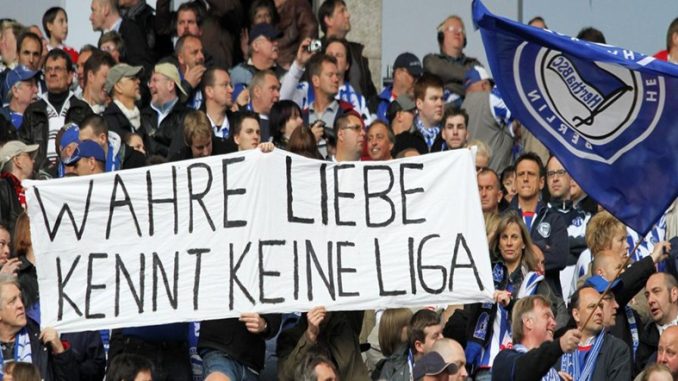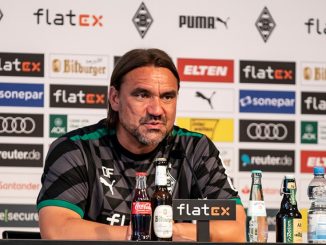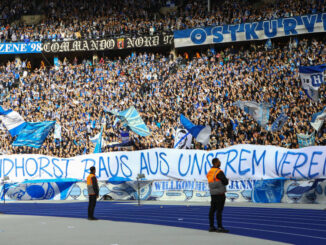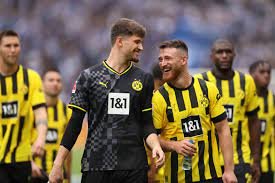
When Hertha’s relegation was finally confirmed, it seemed that the inevitable slide into the 2.Bundelsiga had finally arrived to put the club out of it’s misery and the saying ‘you reap what you sow’ was highly apt for the situation at the self-styled ‘Big City club’.
In terms of omens, being paired with city rivals Union Berlin on the opening day was a harbinger of what was to come for the two clubs. Hertha’s 3-1 defeat at the Alten Försterei was a sobering experience and the precursor to four opening matches without a win and just one point gained.
Hertha weren’t necessarily playing badly, but results were just not going their way. There were only three wins in the whole of the Hinrunde (Augsburg, Schalke and Köln) and they finished just above the relegation places going into the Winterpause. Things weren’t ideal, but there was still the feeling that Sandro Schwarz’s methods would turn things around.
The Rückrunde however started with four consecutive losses (including a 2-0 home defeat to Union) and the downward slide was on. A 4-1 win against Mönchengladbach bucked the trend before they were dismantled by Dortmund by the same score. A win over Augsburg followed but then the positive results dried up and the prospect of relegation once again reared its ugly head.
A 5-2 defeat to fellow strugglers Schalke on matchday 28 brought the impending crisis into full focus and spelt the end for Sandro Schwarz as the club finally lost patience with his ability to stop the ship from sinking and brought in legend Pal Dardai for a third spell in the Hertha hotseat. The messiah however didn’t bring a magic wand with him and losses to Werder and Bayern in his first matches in charge plunged the club closer to the abyss. A win over Stuttgart just delayed the inevitable and when they abjectly lost 5-2 at Köln, there was really no way back. A 1-1 home draw with Bochum confirmed their return to the 2.Bundesliga before the final game of the season- which at least saw a win at Wolfsburg.
There will be pages written about the causes of the decline of Hertha, but a catalogue of mis-management ultimately led to the final relegation of the capital club.
Highlight(s)
With a season like Hertha just endured, looking for highlights won’t be an overly long and drawn out process. The 4-1 win over Borussia Mönchengladbach on matchday 20 was their best of the season and also included a wonder strike from (son of Pal) Marton Dardai. Two of the goals came in stoppage time, but nevertheless when the good times were so rare, it will go down as a highlight.
Lowlight(s)
Sadly for Hertha fans the lowlights are a lot easier to recall. Losing to city rivals Union home and away and seeing the power in the capital switch to the Eisernen was hard to take. The 5-0 home defeat to VfL Wolfsburg stung as did being dumped out of the DFB Pokal at the first round stage on penalties to Eintracht Braunschweig. The 5-2 loss at Schalke stuck another knife in the dying corpse on matchday 28 as did the 5-2 defeat at Köln on matchday 32.
Tale of the Tape
Record: 7-8-19, 29 points (0.85 per game), 18th in Bundesliga
Home Record: 21 points (5-6-6) Away Record: 8 points (2-2-13)
Goals: 42 (1.24 per game), Goals Against: 69 (2.03 per game), Diff: -27
xG: 39.4, xGA: 60.0, Diff: -20.5
Attack
Hertha scored 42 goals this season, which was the third fewest in the Bundesliga but still five more than last season. Dodi Lukebakio was the top scorer with eleven (five penalties), with Marco Richter the next highest with six. Wilfried Kanga didn’t deliver the goods hitting the back of the net just twice (he’d netted 12 times for Young Boys the previous year).
Stevan Jovetic and Jessic Ngankam both scored four, but the pair only made eight starts each this season and were only really unleashed late in the season when the die was cast. The January arrival of Florian Niederlechner also brought no discernible benefit.
Hertha scored all seven of the penalties they were awarded this season and actually had more shots and shots on target than rivals Union Belin, who finished in the top four. Go figure.
Defence
Only Bochum and Schalke conceded more than the 69 goals shipped by Hertha this season, but again it was a similar story to the previous season when the figure was 71. The idea that Hertha just didn’t learn from their mistakes is recurring theme here. Marc-Oliver Kempf was the mainstay in the back four with Agustin Rogel and Filip Uremovic his partners. Neither provided the defensive solidity for which they were bought. Keeper Oliver Christensen performed admirably considering how porous his defence was.
Marvin Plattenhardt and Jonjoe Kenny were the main full backs, but they were preoccupied with defending rather than acting as attacking threats. Hertha perhaps unsurprisingly made the most tackles in the defensive third (307), blocked the most shots and made the highest number of clearances in the league.
Midfield
Lucas Tousart was the fulcrum for Hertha in midfield, but the cast assembled around the Frenchman was sadly lacking in the quality needed to make Hertha competitive. Suat Serdar lacked the consistency and it has to be said he’s gone backwards from the player, who impressed so much at Schalke. Ivan Sunjic was bang average and Pal Dardai will feel justified in telling him to ‘piss off’ during the training ground bust-up.
Kevin-Prince Boateng was past it, Tolga Cigerci’s return flattered to deceive, while the wide areas also disappointed. Chidera Ejuke looked good at the start of the season, but faded big time.
Transfer Review
Looking back in hindsight, having narrowly escaped via the relegation/ promotion play-off, Hertha didn’t really give Sandro Schwarz a strengthened squad with which to compete. None of the incoming players would really have excited anyone with their arrival and in the end the worst squad in the league is usually the one to be relegated.
Wilfried Kanga was signed from Swiss side Young Boys for €5 million but it is clear now that city rivals Union got the better player from the Swiss club when signing Jordan Pefok. Jessic Ngankam returned from his loan at Greuther Fürth, but had to wait until it was really too late to be given his chances. In defence the club scrambled around and signed Filip Uremovic on a free from Rubin Kazan and Agustin Rogel for €400,000 from Estudiantes. Former Schalke right back Jonjoe Kenny arrived on a free transfer from Everton while Jean-Paul Boetius came in from Mainz, but was then side-lined with his testicular cancer diagnosis.
Chidera Ejuke arrived on loan from CSKA Moscow with defensive midfielder Ivan Sunjic coming in from Birmingham City. None of the newcomers can be said to be out-and-out success stories and the positive impact of the whole cohort can be measured on a very small measuring device.
Florian Niederlechner and Tolga Cigerci were added to the squad in January, but there was very little they could do to stop the Hertha ship from sinking.
Player of the Season
Dodi Lukebakio’s goals were a lifeline while goalkeeper Oliver Christensen played well this season while under constant siege. Lucas Tousart was probably the best of a bad bunch as he looked to drag his team forward. He was one of the big-money signings that can actually be said to have been a success. This season he was ranked 11th overall in the league for tackles made and pressed well ranking 12th in the league. He missed just one game all season and contributed five goals to the cause.
Newcomer
Berlin-born striker/winger Derry Scherhant joined the club in 2020 after previously playing for Viktoria Berlin, Tennis Borussia Berlin, and Berliner SC. He made his debut as a substitute against Frankfurt on matchday 2 and made ten appearances this season (two starts). He scored his debut Bundesliga goal in the 4-1 win over Gladbach on matchday 20. With the squad set to lose its big names this summer, Scherhant could move up the pecking order and get a lot more game time in the 2.Bundesliga next season for his hometown club.
Grade: E
An ‘F’ for fail would seem apt, but let’s plump for a grade E for Hertha (splitting hairs over a grade seems pointless when the end result is so bad). The relegation was not the result of just one bad season, but longer-term issues with mis-management, poor player recruitment and chopping and changing the coach too often.
A reboot is needed at Hertha with the ‘Hertha way’ coming to the fore and possibly a growing emphasis on giving their talented youth players a chance. The final game of the season was a slight precursor to the perhaps with six young talents getting game time. The decline has been long-term, Hertha fans will be hoping the recovery is more short-term.




1 Trackback / Pingback
Comments are closed.